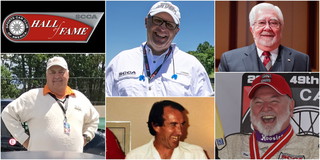
This article first appeared in the February, 2016 edition of SportsCar Magazine. SCCA members can read the current and past editions of SportCar digitally here after logging into their account; To become an SCCA member and get SportsCar mailed to your home address monthly in addition to the digital editions, click here.
Sometimes the fastest way to the front of the field is by finding the right track support team
If you look around the paddock at the National Championship Runoffs for the last few years, you can’t help but notice that the number of independent racers towing their own cars to the championship is shrinking. More and more, drivers are choosing to hire prep shops for at-track support and for car prep throughout the racing year. To give you a better idea of what to expect and how to choose the best possible team, we talked to a number of team-based drivers and the team owners who are putting those drivers on track.
This story has its roots in a conversation that took place at the 2015 National Championship Runoffs presented by Garmin VIRB. A driver who prefers to remain anonymous was having a hard time at the event and was extremely dissatisfied with the service provided by the team he had hired.
“I’m not a mechanic,” he told us. “I don’t have the knowledge or the tools to maintain my own car, and I don’t even have a truck and trailer. I work a lot of hours, so I don’t have time to take care of my car even if I could. I can either have the money to go racing, or the time, but not both.”
That’s the typical profile of a driver who needs team support, and this driver hired a team from a local prep shop to provide Runoffs support.
“They said they had expertise with my car, and that they had gone to the Runoffs before,” he continued, “but there were several incidents where they just didn’t know about common issues. For example, they refused to pump out my fuel tank before qualifying, and they told me to risk it – that the worst that would happen would be I’d lose a qualifying session. That wasn’t acceptable to me.
At the conclusion of the Runoffs, this driver fired his team and sent his car home with a leading national team. “The cost is actually lower and I’m getting a much higher level of service,” he said. “My new team has much better facilities and much more expertise with the car. I was getting chronically overcharged – and my new shop gets a lot more done in much less time.”
Why a team approach?
Even drivers with the skills and equipment to manage their own cars often choose to go with a team. Marshall Mauney of Milwaukee Region has racing experience going back 20 years, including Formula F, Spec Miata, and now Formula Enterprises. He races with the One Formula Racing team based in Illinois.
“I’ve done it both ways,” Mauney says. “I think for someone who is technically oriented and has a relatively simple car, it’s not a big deal to do it yourself. When you get to a more complex car, you reach a point where you can’t do it all yourself simply because there’s too much to keep track of.”
Steve Stadel runs One Formula Racing, and he has some insight into the reasons to choose a team rather than the independent route.
“Our big thing is no mechanical DNFs,” Stadel insists. “As a prep shop, you don’t want a driver losing track time because of a mechanical DNF. If you’re looking for a prep shop, you want to pick one that finishes all the sessions. We want everyone to take the green and the checker.”
Jim Drago is a two-time Spec Miata National Champion, and he runs East Street Racing. “When the car is at our shop after a race, we’re going to do a full nut and bolt, check everything as far as wheel bearings and brakes, take the brakes and hubs apart and check everything, re-lube, and tighten it all back up,” Drago explains. “We check the alignment and scale the car. We re-dyno it, and then we clean it. So, when we get to the track, it’s ready to go.”
The benefits of a team go beyond getting a reliable car. A good team can also help you become a better driver.
“Because we run a spec car, all the team members share data, and that’s good,” Stadel says. “If you have someone who’s faster, you can see why. It’s important in my case to have someone who can go over the data and help to make them all faster.”
“We go over everyone’s data, and generally there are places where everyone can improve,” Drago says. “When you’ve got three fast guys on the team and you compare data, you can see right where you’re gaining or losing. It’s good for all of us. We can always learn somewhere. If your goals are to run at the front and try to win races and win at the Runoffs, it’s very hard to do that as an independent.”
Choosing a support team
You may be sold on the benefits of using a team, but how are you supposed to choose one? This is a critical decision, and you need to carefully consider every option.
“Obviously, the easiest thing to do is talk to team members at the track,” Drago advises. “Look and see if their area is a mess, and see if it looks like a bunch of chaos going on, or do they have everything under control?”
You should also take a look at a team’s past performance, and see if it aligns with your goals. “Results matter,” Drago says. “If you want to win and run at the front and no one on that team is doing that – or there’s one guy out of 10 on the team who can do that, then you’d want to think about that.”
Stadel agrees, emphasizing results and preparation. “You need to look for someone who has experience with the type of car you’re driving,” he says. “You need someone who has the equipment at the track to sort out and change a setup, and you want to consider their finishing record, and their ability to get a car back on the track after an issue.”
Mauney evaluates teams on a very personal level. “You want to look at a team that suits your communication style. If you can’t work well with the crew and the team owner, you’re not going to have a good time. But if you think the same way and approach problems the same way, a good team almost becomes an extension of yourself,” he says.
Mike O’Callaghan’s Flat Out Racing is among the leading teams in Spec Racer Ford. Working together with the Pro Drive Racing Team, O’Callaghan has helped put several drivers on the Runoffs podium over the years.
“I think a driver should expect that their car will be prepared much better than they could do themselves, and they should be able to go out on track feeling that their car is in top competitive condition,” O’Callaghan says. “The crew should also be willing to put in the time and work their hardest to put a car back on the track in the event of a crash or a breakdown.”
But every team owner emphasizes the less tangible human aspects that are nonetheless critical to a driver’s success. “There’s a social element that’s really important to what we do,” O’Callaghan says. “I think it should be a fun experience. It should be fun because it costs a lot of money and the biggest thing you’re going to take away from racing is the experience.”
Managing your budget
When you join a team you are hiring professionals who possess very rare skills and a huge inventory of expensive equipment. The costs may be surprising at first. “There are people who would like to go to a prep shop but they don’t feel they have the dollars to do that. I had a driver who felt that the dollars were more than he could afford, so he went on his own. Within a short time he broke a transmission and then lost an engine, and he came back. All that could have happened under my tent, too, but he felt he was better off not racing as much but being under my tent,” Stadel says.
Costs will vary widely depending on the level of service you need and the team you choose. Yet as our anonymous Runoffs driver discovered, a big name team may be more affordable than a budget outfit. The only way to know is to ask.
“For me, since I don’t have an infinite budget, I need to be with a shop that has clear pricing up front, and allows us to make those decisions through the season,” Mauney declares. “You’re going to get what you pay for, and everyone’s looking for a different experience.”
It’s also true that spending a little extra money could yield dramatically improved results at the track. “Just weigh out your options carefully and see what you’re really trying to get out of racing,” advises Drago. “Sometimes a prep shop could be relatively inexpensive, or very expensive depending on how you value your time. It’s going to vary from person to person.”
Let the team work
One final point is that some teams offer more of a cafeteria program where you can pick and choose services, but most will want you to commit to a program. That protects the team’s financial stability and prevents misunderstandings based on incomplete service and maintenance.
“If we’re going to take care of a car, I want the car,” says O’Callaghan. “I don’t want to just be the guy who takes care of a car at the track. The big thing for me is preparation of the cars before we get to the racetrack. We go through the cars pretty deeply to catch the little stuff that’s coming up that could go wrong.”
Every team owner says the same thing – hiring a team should be a complete package. “Sometimes drivers don’t want to do the prep work in the shop – they want to do it at the track because it’s included,” Drago notes. “I refuse to do that. When we get to the track, the goal is not to work on the car. So, we try to get everything done before we get there because the track presents enough problems.”
The bottom line on working with a team is simple – if you know what you want, find a team that can deliver the level of service you need and be clear about costs and expectations. The result is likely to be a much more satisfying and successful racing experience than you’ll get by going it alone.
10 rules to perfect your team experience
1. Make a budget for your racing season, and make plans for what you will do if you reach the end of that budget midseason.
2. Insist on a contract with fixed terms. Make sure your contract specifies everything the team will do and provide. If you miss sessions because of the team’s errors, is there a refund?
3. Agree on the level of support the team will provide at the track. If something needs to be repaired at the track, will it be covered under basic track support, or will you be charged extra? Specify the spares the team will have on hand at the track. Also specify who will buy those spares and their prices if used.
4. Work out the driver services the team will provide at the track. Will the team provide food and drinks? Is the driver expected to pick up the tab at dinner? Is there an RV at the track? Who will arrange and pay for hotel rooms?
5. Make sure your contract includes a time limit for the team to notify you of charges, and specify what charges must be approved in advance.
6. SCCA holds the driver responsible for rules compliance, including crew behavior. Is the team familiar with all of the rules and supplemental regulations?
7. Know how many drivers the team will be supporting. Do the decisions of other drivers to attend or skip an event affect your costs?
8. Understand the team dynamic. Will you have access to team setup knowledge, on-track data interpretation, and coaching from other team members? Ask if the team has leading drivers or other experts who can test-drive your car to help diagnose issues.
9. Learn what the team will charge for an initial inspection and test when you bring your car to the shop for the first time. For that fee, will the team provide you a list of all necessary repairs to make the car safe, reliable and competitive, or is that information contingent on hiring the team to make the repairs?
10. Discuss the level of preparation you want for your car. It can cost many thousands of dollars in parts and labor to run at the front and, if your skills need sharpening, that money might be better spent on coaching and seat time.
Words by Jeff Zurschmeide
Image by Clark McInnis










